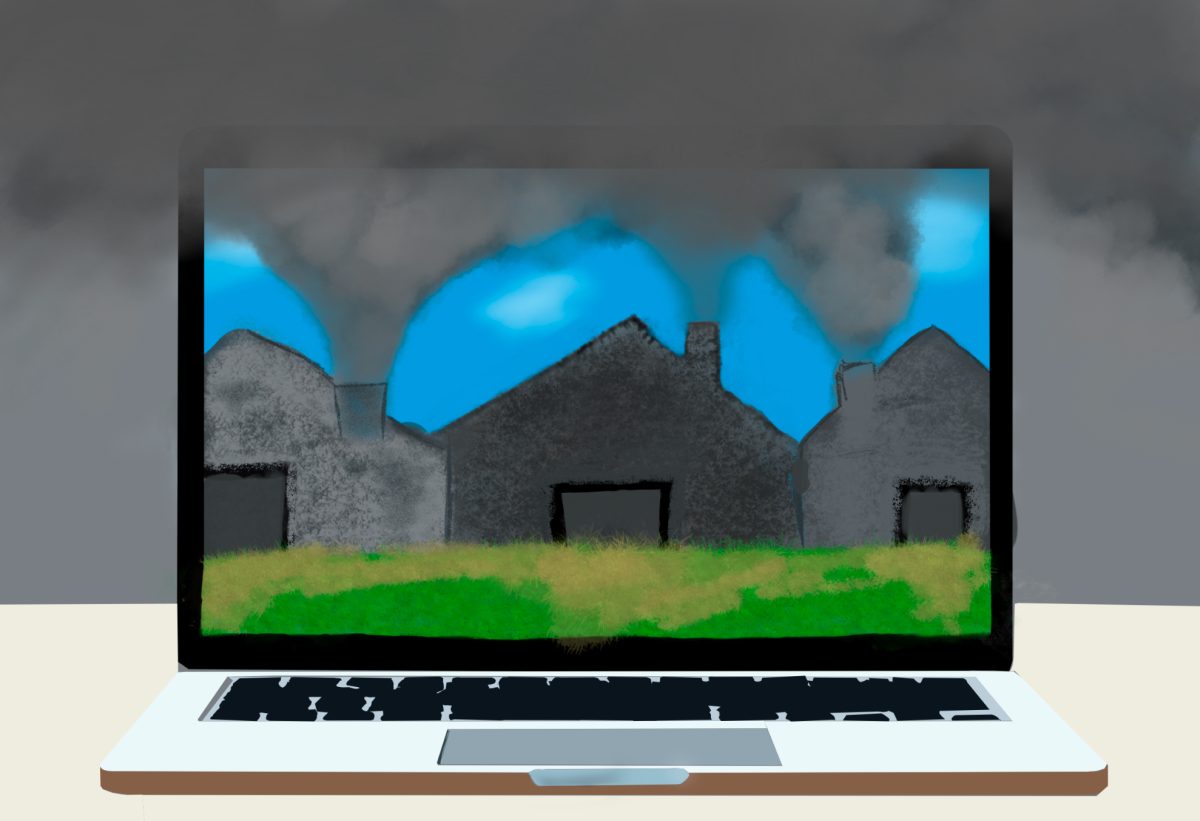
Rai Gutierrez
At a young age, my family taught me about the unsustainable practices of the meat and dairy industry. I was fortunate to receive this information, which enabled me to make informed choices about my diet. However, in a society where eating animal products is normalized, my experience was rare.
In recent years, Poly has put a big focus on sustainability. Our school has transitioned towards clean energy, emphasized the importance of composting and reduced the use of plastics. In the classroom, biology courses teach about the basics of fossil fuels and energy, and electives like the climate change class dive even deeper. So, for all the work Poly is doing, why are we leaving out such a key component of global warming—factory farming? It’s time for our science curriculum to address the environmental impacts of factory farming.
Factory farming is a method used in the meat and dairy industries that utilizes a confined setting to exploit animals and the environment for increased profits. Compared to traditional farming, factory farms are significantly less sustainable. According to the United States Department of Agriculture, 99% of livestock are factory farmed in America. In other words, factory farming is unavoidable when shopping for animal products, and these farming methods have a significant impact on the environment. According to the Food & Agriculture Organization of the United Nations, 12% of all greenhouse gas emissions come from the factory farming of animal products, not even accounting for the fact that the meat industry has cut down forests to make way for factory farms, eliminating the carbon sinks that absorb CO2. And according to Vox, factory farms pollute air and water, especially for people who live close to the facilities.
The problem is, there is a lack of understanding about the role the meat and dairy industries have in global warming. Without sufficient comprehension of the harms of their food system, it is unreasonable to expect students to shift towards more sustainable and ethical products. It is Poly’s role to provide this information. Even though it may be uncomfortable for Poly to teach about a system that is so integral to people’s diets, this is not a reason to avoid this topic. Understanding challenging issues is a key part of education. This is not to say that Poly should discourage eating meat. Instead, the science department should provide enough knowledge for students to make up their own minds. Science should connect to the problems we are facing, and the environment is an urgent one.
So why isn’t factory farming part of the curriculum? Science Department Chair Rachel Dunham explained, “We have to pick and choose what we can teach in the time that we have. So if we are really thinking about giving students science skills, keeping students engaged in science, and being ready for taking science in college, there, by definition, has to be a give or take.”
Of course, the Poly science curriculum cannot teach everything. But leaving out such an important topic is inconsistent with the goals Poly has made, and undervalues the importance of understanding climate change. According to the school’s website, “the climate crisis is arguably the greatest threat facing humanity.” It emphasizes, “educating students about climate change is also a priority for Poly.” So, in the process of “picking and choosing” relevant topics, the science department should emphasize learning about such a significant crisis. This does not require the science department to restructure the entire curriculum and make changes to what units are taught. Even adding a couple of lessons would be an improvement.
And while the science department could instead create an elective about this issue, doing this would give students the choice to opt in to taking a class about a topic that many people would prefer to ignore.
While learning about sustainability in general is important, factory farming is a specific issue that needs more attention. Progressive policy has championed clean energy, but we continue to live in a society that accepts and even encourages the practices of the meat and dairy industry. Many people are naive and indifferent to factory farming because eating animal products has become part of our culture, making it more difficult to give up. But we cannot continue to ignore a system that causes devastation for our Earth.
Because there is less understanding about factory farming compared to other causes of global warming, teaching about it would be more productive. After all, what is the reason to learn about something that people are already more knowledgeable about, compared to learning about a new topic that is less likely to come up in other places?
“I would appreciate even a little bit of information,” said sophomore Maggie Scholze. “Factory farming contributes greatly to climate change and the health of poorer communities surrounding these industries. Even one video of these factory farms has the potential to change minds.”
Dunham repeatedly mentioned that if students want to present on this topic, they should. However, the burden should not be on the students to teach the material.
When I suggested that learning about sustainability is more dire than other aspects of science, Dunham rejected this idea. “I don’t [think learning about sustainability is more dire] because they’re both important. I think understanding climate science and sustainability is really important, but you’re not going to be able to understand any of that unless you have a background in biology, chemistry, and physics.” The problem is that, for those who do not go into the science field–more specifically, the climate science field–not understanding one of our greatest crises will pose a problem. As our earth continues to face irreparable damage, only time will tell if we made the right choices.